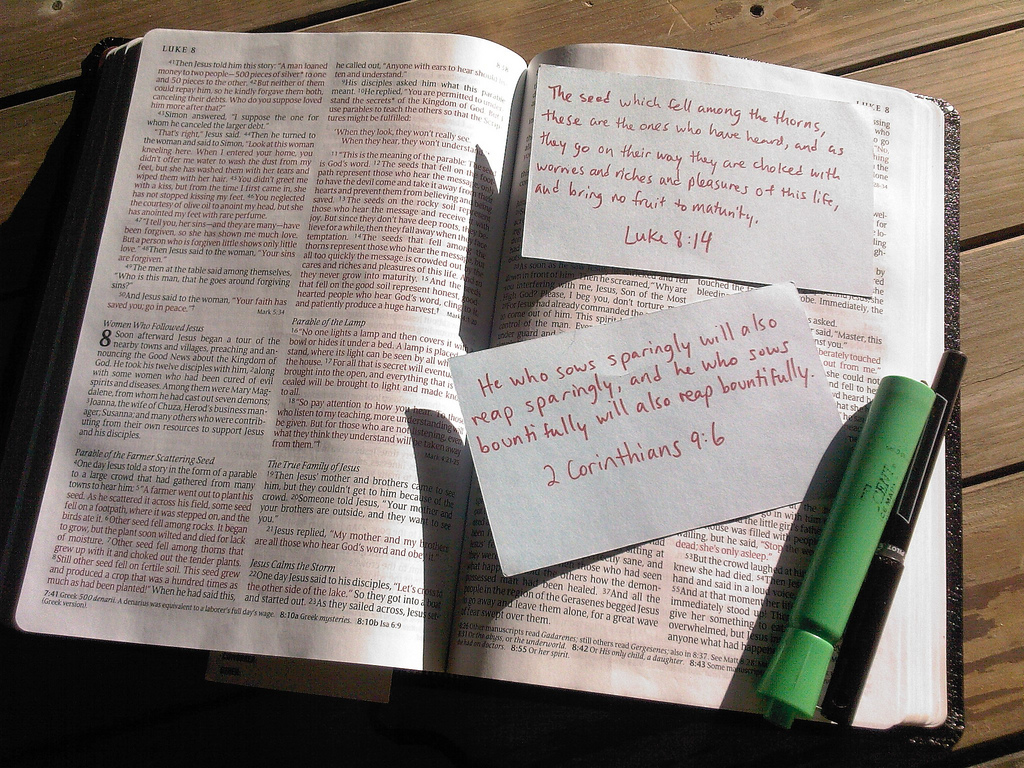3 vital questions to ask yourself when picking a Bible translation for memorization
 Photo Credit: UnlockingTheBible via Compfight cc
The very first “real Bible” I remember having as young child was the Good News Bible. It’s a easy-to-read paraphrase with line drawings. I loved it, and still read from the GNB on occassion for nostalgia’s sake. After that I “graduated” to the New International Version (NIV), but as I learned more about Bible translation philosophy, I became enamored with more “accurate” word-for-word translations. For a big chunk of high school I studied out of the New American Standard Version (NASB), while keeping the New King James Version (NKJV) on hand for general reading. In college I began using the English Standard Version (ESV) and have pretty much settled on that one as my primary reading and memorizing translation.
Photo Credit: UnlockingTheBible via Compfight cc
The very first “real Bible” I remember having as young child was the Good News Bible. It’s a easy-to-read paraphrase with line drawings. I loved it, and still read from the GNB on occassion for nostalgia’s sake. After that I “graduated” to the New International Version (NIV), but as I learned more about Bible translation philosophy, I became enamored with more “accurate” word-for-word translations. For a big chunk of high school I studied out of the New American Standard Version (NASB), while keeping the New King James Version (NKJV) on hand for general reading. In college I began using the English Standard Version (ESV) and have pretty much settled on that one as my primary reading and memorizing translation.
Obviously, there are almost too many fine options available today for reading the Bible in English. However, you’ll want to choose one main translation for reading and especially for memorizing. Choosing a primary translation will help you with memorization because you will become familiar with the “flow” of the whole text. Rhythm, vocabulary, tone, and other matters of style will be more consistent from passage to passage. This makes recall easier and your presentation smoother when you are using your memorized passages while preaching, teaching, praying, and in conversation.
Here are three vital questions to ask yourself as you choose a Bible translation for memorization.
1) Where am I already comfortable?
If you are already very familiar with a quality translation (say, the Holeman Christian Standard Bible) then it probably makes sense for you to stick with it. You’ll want enjoy reading and reciting from the text (as much as possible) and avoid the obstacle of syntax that seems awkward to you.
2) What translation philosophy resonates with me?
If you haven’t already found a “translation home,” you may want consider what’s most important to you in a translation. Is it getting the basic point across in an accessible way? You’ll want to take a look at thought-for-thought translations like the NIV, or even the NLT. Are you most concerned with fidelity to the actual words used in the original text? NASB is your best bet there. Does beautiful language speak to your soul? There’s no more beautiful piece of literature in English than the King James Bible.
3) What is my ministry and cultural context?
How will you be using your memorized to passages to minister to others? If you’re primary ministry is to young children, then the KJV may not be the best choice! What translation does your pastor preach from? What do most of the people in your congregation read?
What primary translation for reading memorizing Bible verses did you choose? How did you come to your decision?
 NRH
NRH